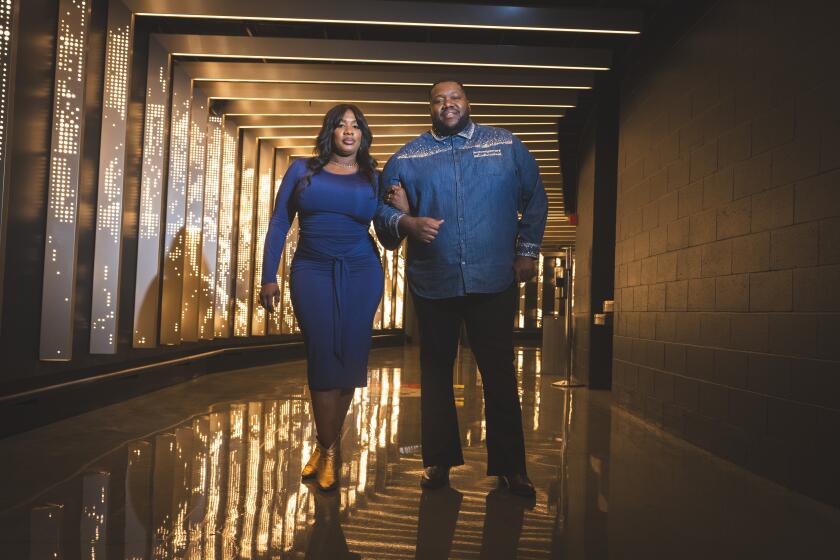Iron and Wine’s Sam Beam is OK with being a nobody at Home Depot

- Share via
Riding down the 101 Freeway in the back seat of his manager’s SUV on a recent rainy evening, Sam Beam is talking about his kids’ lunches — specifically about how annoying it is when they don’t eat what he gets up early to pack for them.
“Same thing with dinner,” he says in his soft Southern drawl. Beam, who’s 49 and makes spectral yet meticulous folk music under the name Iron and Wine, lives in Durham, N.C., and has five daughters with his wife (though not all of them live at home anymore).
“You find something new you’re excited to make, then you put it on the table. Totally uninterested.” He laughs. “I’m like, ‘OK, tomorrow, you’re on your own. Best of luck.’”
Ahead of a SoFi Stadium gig with the Rolling Stones, Michael Trotter Jr. and Tanya Trotter of the War and Treaty talk about finding a home in Nashville.
He jokes because he cares: Beam’s latest album, “Light Verse,” is Iron and Wine’s first studio LP since before the pandemic, a period of creative frustration for the songwriter that he nonetheless believes improved his relationship with his children.
“I travel a lot,” he says of his life as a musician, “and as they turn into these teenagers, unless you put in the time, they don’t really give a s— if you disappear. I mean, they’ll hold it against you. But they’re not gonna say, ‘Maybe I could try to get close to Dad.’” Yet due to COVID, “I was suddenly around more than I ever had been,” he adds. “It was definitely a silver lining.”
The long stint at home might be why Beam sounds preoccupied on “Light Verse” with thoughts of time, memory, manhood and the delights and obligations of love. “What goes in is never what comes out / The hole in a yard ball, some pieces of seashell,” he sings amid a tangle of acoustic instruments in “Tears That Don’t Matter.” “You’re only empty as a lost and found / Sounds from a house, the end of a candle.” In the tender “Taken by Surprise,” he ponders the impermanence of a goodbye; “Angels Go Home,” a stark ballad shadowed with strings, closes the album with a rhyme of “sons and daughters” and “stones in holy water.”

Beam made “Light Verse” in Los Angeles, a city he’d visited frequently if somewhat begrudgingly for various promotional duties over the course of his two decades with Iron and Wine. “Usually, the areas where you’re working kind of suck,” he says over dinner at a Hollywood restaurant. The singer, whose piercing eyes and scraggly beard give him a wizened-philosopher look at odds with his sly sense of humor, is in town rehearsing with his road band in Burbank ahead of a tour that will bring him back here for gigs at the Bellwether on Friday and Saturday nights. “It’s hectic and kind of rushed, and then you just leave.”
Yet this recording project was different: Sebastian Steinberg, who’s played bass with Beam for about 10 years (and who also plays with Fiona Apple), recommended he set up at producer Dave Way’s studio in the relative wilds of Laurel Canyon. They assembled a band of crafty Angelenos, including guitarist David Garza, keyboardist Tyler Chester and Dawes drummer Griffin Goldsmith; Apple even contributed vocals to a waltz-time duet, “All in Good Time,” with Beam’s breathy croon against her earthy rasp. The pace was relaxed, the vibe exploratory. Says Beam: “I’ve always loved that idea of people coming to California to find some sort of freedom.”
For all their ties to Beam’s personal experiences, the songs on “Light Verse” aren’t strictly diaristic in the style of so much 2020s songwriting; he uses his imagination to push real-life characters in fictional directions and often revels in the pure sound of words. “Doves are losing lucky feathers in the sky / Appaloosas in the moonlight going blind,” he sings in “Yellow Jacket.”
Ahead of dual performances at Saturday’s Just Like Heaven festival, Ben Gibbard talks about his overlapping careers with the Postal Service and Death Cab for Cutie.
“I use things from my life as a springboard,” Beam says, “but I don’t want to have to be truthful to the story, like we’re in a court of law. A song isn’t an essay about a certain point I want to make. It’s engaging with language to see what happens.”
One of the album’s prettiest tracks, a delicately fingerpicked tune called “Cutting It Close,” opens with an unexpected couplet all the more jarring for how tenderly he sings it: “Long-lost friend of mine / I know we only f—ed a couple of times.” Asked where the line came from, he laughs. “My process is to just sort of strum along and hum syllables, and that phrase popped out at some point. I’m like, ‘All right, that’s pretty crass.’ But it sets you up for something complicated, which is a fun spot to be in as a writer. Where do you go from there?”
Several songs, including “You Never Know” and “Taken by Surprise,” employ refrains that Beam uses over and over again until the words become like mantras; indeed, the music’s intricate rhythmic interplay — “Anyone’s Game” is downright funky — seems as important to Beam as his heart-tugging melodies, even though he knows the latter are what his fans tend to prioritize. “Emotional porn,” he calls the thing for which he reckons people come to him.

“In another life, I hope to be a drummer,” he says, smiling. “I like to be in the middle of the movement. For me, the movement is where the voice is always coming from.”
As a guy on the verge of 50, Beam has been thinking a bit about where he fits into a music industry that feels pretty far away when he’s at home making uneaten lunches. He came up in the early 2000s “during the last vestige of the monoculture, where everyone’s looking for what’s coming through certain channels.”
The venerable Seattle indie label Sub Pop signed him on the strength of some lo-fi demos he’d made, and he was promptly “plopped into the lap of Sub Pop listeners happy to give a chance to whatever they delivered.”
Today, he watches his daughters encounter songs through TikTok’s mysterious algorithm and wonders how any new artist can reasonably predict anything about his or her career. Then again, Beam couldn’t have foreseen the success of his hushed acoustic version of the Postal Service’s “Such Great Heights,” which achieved a primordial version of virality when it was featured in the 2004 movie “Garden State” — and now has more than 84 million plays on Spotify.
Would he say he ever feels like a famous person? He looks around the crowded restaurant as if to say: Think anybody recognizes me here? (Even with the beard, that’s a no.) What about in Durham? “I mean, it depends where you go,” he says. “If I go to the hippie grocery store, they know who I am. If I go to Home Depot, they don’t give a f—.”
More to Read
The biggest entertainment stories
Get our big stories about Hollywood, film, television, music, arts, culture and more right in your inbox as soon as they publish.
You may occasionally receive promotional content from the Los Angeles Times.













